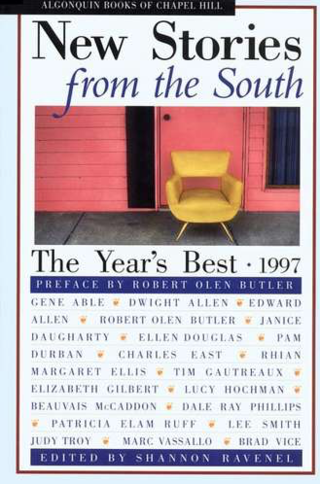"Every Building Wants to Fall," in New Stories from the South, Best of 1997
From Kirkus Reviews
The 11th installment in this excellent series is certainly one of the strongest, with 19 stories that capture the diversity of the South in voice and place, drawing on a range of old and new talents. The Old South of decaying mansions, men in seersucker, and women in lace is well recalled in first-rate tales by Charles East (``Pavane for a Dead Princess''), who meditates on the phenomenon of elderly ladies and their young male companions; by Pam Durban (``Gravity''), who beautifully records the decline of a once- distinguished Charleston family; and by Ellen Douglas (``Julia and Nellie''), who offers a tale of friendship transcending serious religious conflict. The rural and working-class South provides its own meaning and wistfulness: In Judy Troy's ``Ramone,'' a young girl relocates to the small Texas town where her stepfather's father lies dying; in Patricia Elam Ruff's moving and elegiac ``The Taxi Ride,'' an elderly woman, tired but happy in her long marriage, finds a welcome friend in a courtly cab-driver; in Janice Daugharty's ``Along a Wider River,'' a former sharecropper watches his old boss fumble and die while fishing; and in Rhian Margaret Ellis's ``Every Building Wants to Fall,'' a fatherless girl, feeling powerless and hopeless as well, discovers a perverse strength in causing her friend's epileptic seizures. Some inspired low comedy (and more class conflict) comes from two familiar experts: Tim Gautreaux's ``Little Frogs in a Ditch'' is a droll tale concerning a no-account loser who sells common roof pigeons as homing pigeons; and Lee Smith's unsparing ``Native Daughter'' turns on the conceit of its haughty narrator, a pretty girl from Kentucky who doesn't realize that her clubby male companions consider her easy trash. Robert Olen Butler's tetchy introduction--with its bristling at the notion of ``Southern'' fiction--insists on the universality of art, but his fears are misplaced. The superb stories here quietly demonstrate that the universal always resides in the particular. -- Copyright ©1997, Kirkus Associates, LP. All rights reserved.
